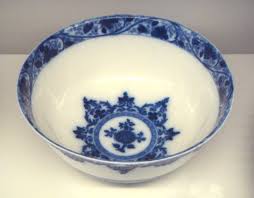中文词源
porcelain 瓷器
来自中古法语procelaine,来自意大利语porcellana,贝壳,瓷器,因其相似的光泽而得名,来自拉丁语porcellus,小猪,词源同pork,-elle,小词后缀。据说是因为贝壳的孔隙有如母猪的外阴而得名。
英语词源
- porcelain
-
porcelain: [16] The bizarre history of the word porcelain leads us back to a pig’s vagina. It was originally applied to fine china in Italian, as porcellana. This meant literally ‘cowrie shell’, and was used for the china in allusion to its shelllike sheen. Porcellana was a derivative of porcella ‘little sow’, a diminutive form of porca ‘sow’ (to which English pork is related), and was applied to cowrie shells because they supposedly resembled the external genitalia of female pigs. English acquired the word via French porcelaine.
=> pork - porcelain (n.)
- 1530s, from Middle French porcelaine and directly from Italian porcellana "porcelain" (13c.), literally "cowrie shell," the chinaware so called from resemblance of its lustrous transparency to the shiny surface of the shells. The shell's name in Italian is from porcella "young sow," fem. of Latin porcellus "young pig," diminutive of porculus "piglet," diminutive of porcus "pig" (see pork (n.)). According to an old theory, the connection of the shell and the pig is a perceived resemblance of the shell opening to the exposed outer genitalia of pigs.
porcelain is china & china is p.; there is no recondite difference between the two things, which indeed are not two, but one; & the difference between the two words is merely that china is the homely term, while porcelain is exotic & literary. [Fowler]
权威例句
- 1. Place them in a jam jar, porcelain bowl, or other similar container.
- 将它们装入果酱罐、瓷碗或其他类似容器中。
- 2. There were lilies every-where in tall white porcelain vases.
- 高高的白色瓷瓶上绘满了百合花。
- 3. Arlott squirrelled away books, pictures and porcelain plates.
- 阿洛特将书本、图片和瓷盘瓷碟都藏起来。
- 4. a dainty porcelain cup
- 小巧玲珑的瓷杯
- 5. These porcelain plates have rather original designs on them.
- 这些瓷盘的花纹很别致.

